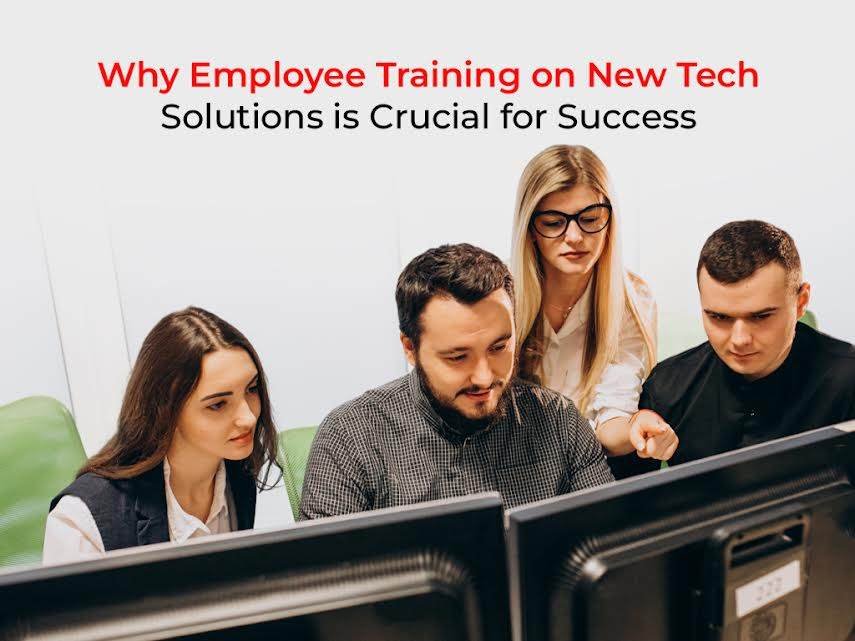
In the present rapidly developing corporate scene, remaining ahead of the opposition depends on an association’s capacity to adjust to new advancements. However, embracing state-of-the-art apparatuses and programming isn’t sufficient.
Employee training is fundamental to completely bridle the capability of these developments. Organizations, particularly those utilizing Contract Staffing Services in Bangalore, should focus on furnishing their groups with the information and abilities necessary to amplify efficiency and effectiveness.
Let’s look into why employee training on new tech solutions is crucial and how it significantly contributes to organizational success.
The Changing Technological Landscape
The speed of innovative headway has never been quicker. From computerized reasoning to distributed computing, robotization, and refined Payroll Management Systems, organizations are immersed with chances to smooth out tasks and improve direction.
In any case, without legitimate preparation, representatives might battle to use these advancements successfully, prompting underutilization and a deficiency of the upper hand.
Key Benefits of Employee Training on New Technologies
1. Boosting Productivity
Well-trained employees can seamlessly integrate new tools into their daily operations. For instance, understanding a robust Payroll Management System eliminates manual errors, ensures timely payroll processing, and allows HR teams to focus on strategic initiatives. This improvement in operational efficiency translates directly into enhanced productivity.
2. Reducing Resistance to Change
Change is frequently met with obstruction. Workers might feel scared or compromised by new advancements, dreading that their jobs could become old. Legitimate preparation mitigates these worries by showing the way that these instruments can work on their assignments and intensify their effect inside the association.
3. Enhancing Employee Satisfaction and Retention
Putting resources into representative preparation flags an organization’s obligation to proficient turn of events. Representatives who feel upheld and esteemed are bound to remain faithful to their bosses. This is particularly significant for organizations involving Contract Staffing Services in Bangalore, where cultivating a positive work environment culture can prompt expanded agreements and better group unions.

4. Improving Decision-Making
With legitimate training, employees can use information-driven experiences given by cutting-edge instruments. For instance, AI-powered tools or a Payroll Management System can offer significant bits of knowledge that engage pioneers to rapidly settle on informed choices.
5. Ensuring Compliance and Security
Numerous technologies, for example, cloud-based arrangements and finance programming, require severe adherence to information security guidelines. Employee training guarantees everybody grasps these consistence prerequisites, lessening the gamble of breaks and related punishments.
Challenges in Implementing Employee Training
Despite its benefits, training employees on new technologies is not without challenges. Some common hurdles include:
- Time Imperatives: Representatives frequently shuffle various obligations, generally ruling out preparing.
- Monetary Worries: Complete training projects can be costly.
- Ability Holes: Representatives’ changing degrees of mechanical capability can make uniform preparation troublesome.
- Obstruction: A few workers might be hesitant to leave their usual ranges of familiarity.
To conquer these difficulties, organizations ought to fit preparing projects to their labor force’s particular requirements, utilizing intelligent and adaptable learning strategies.
Tailoring Training Programs for Success
1. Assess Employee Needs
Before implementing a training program, conduct a thorough assessment of your employee’s current skills and knowledge gaps. For companies utilizing Contract Staffing Services in Bangalore, this step is crucial for ensuring even short-term hires can quickly adapt and contribute.
2. Offer Flexible Learning Options
E-learning modules, online classes, and independent courses give workers the adaptability to learn whenever the timing is ideal. These choices are especially gainful for occupied experts who need to offset preparing with their current obligations.
3. Incorporate Hands-On Practice
Hypothetical information alone is deficient. Furnishing representatives with certifiable situations and involved experience guarantees they can apply what they’ve figured out how to their jobs actually.
4. Engage Expert Trainers
Bringing in external experts or partnering with technology providers ensures employees receive high-quality training. This is especially relevant when integrating complex systems like Payroll Management Systems, which require a deep understanding of functionalities and compliance requirements.
5. Monitor Progress and Provide Feedback
Tracking employee progress during training and offering constructive feedback helps them improve and stay motivated. It also allows employers to refine training programs for future needs.
The Role of Leadership in Driving Training Initiatives
Leadership plays a pivotal role in the success of training programs. Leaders must:
- Champion the Cause: Demonstrate the importance of training by actively participating and encouraging their teams.
- Provide Resources: Allocate sufficient budgets and time for comprehensive training.
- Set Clear Goals: Define the desired outcomes and align training programs with organizational objectives.
- Celebrate Success: Recognize and reward employees who excel in adapting to new technologies.
Real-World Examples of Training Success
Case Study 1: Contract Staffing Success in Bangalore
A leading IT firm in Bangalore, heavily reliant on Contract Staffing Services, implemented an AI-powered project management tool to streamline operations. Initially, contract staff struggled to adapt, leading to delays.
By putting resources into a designated preparation program, the organization furnished its group with the important abilities, bringing about a 40% improvement in project times required to circle back and a critical lift in client fulfillment.
Case Study 2: Payroll Transformation
A mid-sized organization revamped its payroll process by introducing a cutting-edge Payroll Management System. However, initial hiccups caused delays in salary disbursement and employee dissatisfaction. Post-training, the HR team mastered the system’s functionalities, ensuring seamless payroll processing and improved morale.
The Future of Employee Training
As technology continues to evolve, the importance of continuous learning cannot be overstated. Future training programs will likely leverage:
- Virtual Reality (VR) and Augmented Reality (AR): Immersive technologies for hands-on learning experiences.
- AI-Powered Personalized Learning: Tailored training modules based on individual strengths and weaknesses.
- Gamification: Engaging employees through game-based learning techniques.
By staying ahead of these trends, companies can ensure their workforce remains agile and competitive.
Conclusion
Employee training on new tech solutions is no longer optional—it’s a strategic necessity. For businesses leveraging Contract Staffing Services in Bangalore or integrating advanced tools like a Payroll Management System, a well-trained workforce is the key to unlocking the full potential of these technologies.
By addressing training difficulties and fitting projects to representatives’ necessities, associations can drive advancement, upgrade efficiency, and secure long-haul achievement. Putting resources into your representatives today is the surest method for guaranteeing your organization flourishes tomorrow.
